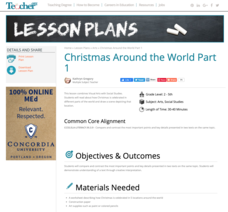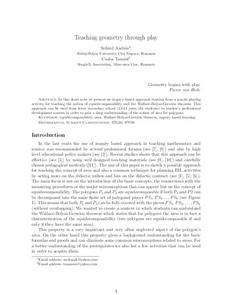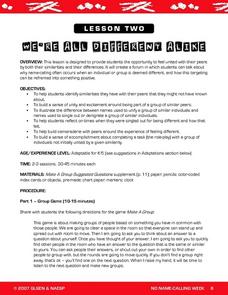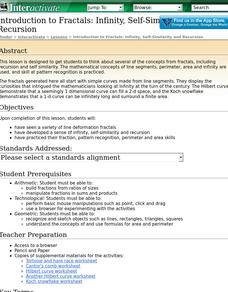Curated OER
Collecting Different Seashells
In this collecting different seashells worksheet, students look at the picture of wight seashells and tell how many different kinds there are.
NOAA
What's the Difference?
Due to the isolation of seamounts, their biodiversity offers a great deal of information on the development of biological and physical processes. Pupils use simple cluster analysis to rate the similarity and differences in biological...
Council for Economic Education
Banks and Credit Unions (Part 1)
Imagine you have money you want to save ... where do you put it? Pupils investigate the similarities and differences of banks and credit unions as they determine where exactly to place their hard-earned money. Through a WebQuest,...
Equality and Human Rights Commission
Learning area 1: Who am I?
Five activities encourage scholars to dream big and celebrate the similarities and differences of those around them. Learners take part in two active practices that showcase how their peers are the same and different. Worksheets...
Super Teacher Worksheets
Accept and Except
Accept and except: although these two words sound similar, their meanings are very different. With a 10-question worksheet, grammar enthusiasts prove their understanding of the two commonly confused words by reading...
Teacher.org
Christmas Around the World Part 1
A creative instructional activity shines a spotlight on Christmas celebrations throughout six different countries. Scholars read an informative text and share their new-found knowledge with their peers. After hearing about each country,...
McGraw Hill
Triangles
After reviewing characteristics of seven types of triangles, young geometers discover how to find the missing angle of a triangle. Then, they practice identifying triangles, find missing angles, and find missing side lengths of...
Journey Through the Universe
How Far is Far?
The earth only revolves around one thing — and it's not any of your pupils. The lesson includes two activities dealing with the distance to the sun and the moon. First, scholars create a pin hole camera and use the rules of similar...
Prestwick House
Analyzing Multiple Interpretations of Literature
There is a reason why an Oscar is given each year for the Best Adaptation Screenplay. Adaptations are the focus of an exercise that asks class members to compare a work of literature with a least one adaptation of the work into a...
Mascil Project
Teaching Geometry Through Play
Puzzle your way through to a new understanding of area. Scholars learn about the area of polygons through equidecomposability, the idea that polygons that can be decomposed into the same set of pieces have the same area. By using...
English Worksheets Land
Compare and Contrast - Popcorn
Discover why popcorn pops and how it found its way to the movie theatre with a worksheet that reinforces comparing and contrasting skills. Scholars read two brief passages then share through writing the similarities and differences they...
Curated OER
We're all different alike?
Students identify similarities and differences that they have with their peers. They explore why name-calling often occurs when an individual or group is deemed different, and how this targeting can be reframed into something positive
Curated OER
The Same, Similar, and Different
In this same, similar, and different instructional activity, students compare seven shapes and fill in the blanks with like or alike. Students answer eight comparisons.
Curated OER
Similar or Different
For this similar or different worksheet, students determine if pairs of words are synonyms or antonyms. Students choose twelve answers.
Curated OER
Similarity and Congruence
Students determine that two figures are similar or congruent by
investigating figures that are similar and figures that are congruent. They prove that two figures are similar or congruent by using definitions,
postulates, and theorems.
Curated OER
Where Is Japan? How Are We Alike And Different?
First graders use literature, maps, and globes to explain how physical environments in various parts of the world are similar to and different from one's own, and that certain areas have common characteristics and can be called regions.
Curated OER
Similarity
Students find the factor of proportionality in similar polygons. In this similarity of polygons lesson plan, students measure the sides and angles of polygons and derive a factor of proportionality between corresponding pairs of sides...
Curated OER
Lettuce Us Be Different
Students evaluate their differences, then look at differences in plants. In this class team building and life science lesson, the class play a game that focuses on similarities and differences in the group, then students plant three...
Curated OER
Similar triangles
Tenth graders investigate the theorems of ASA, AAS, AAA and ASA. In this geometry lesson, 10th graders discuss the theorems of triangles and how it is used to solve for missing sides or angles. They review how two angles are formed by...
Curated OER
Introduction to Fractals: Infinity, Self-Similarity and Recursion.
This instructional activity introduces students to the ideas involved in understanding fractals. They develop a sense of infinity, self-similarity and recursion and
Curated OER
Different, Yet the Same
Students explore cultural differences. In this cultural differences instructional activity, students complete a webquest traveling to different countries. At the conclusion of the webquest students create a slide show on KidPix.
Curated OER
Odd One Out Worksheet
In this similar objects worksheet, students study 15 rows of objects and determine which object in each row is different than the other ones. Students check off their answers.
Curated OER
Animals, Animals, Everywhere
Fourth graders participate in a variety of activities dealing with animal characteristics and classifications in this multi-task lesson. They use graphic organizers, make booklets, and make models.
Curated OER
ALIKE, DIFFERENT, OR BOTH?
Learners compare and contrast two characters from the play The Diary of Anne Frank on a Venn diagram and write a paragraph showing similarities and differences.























